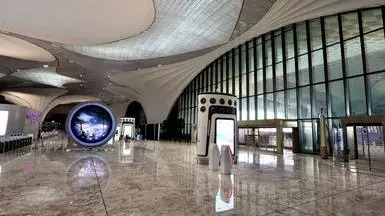Navi Mumbai Airport to Power 2 Lakh Jobs, Position City Among Global Aviation Hubs Like London and Paris

Navi Mumbai Airport to Power 2 Lakh Jobs, Position City Among Global Aviation Hubs Like London and Paris
Spanning 1,160 hectares, the Navi Mumbai International Airport (NMIA) combines Indian heritage with sustainable engineering, poised to transform Mumbai into a twin-airport global hub.
Prime Minister Narendra Modi is set to inaugurate the Navi Mumbai International Airport (NMIA) on October 8, 2025, marking a defining moment in India’s aviation history. Spread across 1,160 hectares, the airport is being developed under a public-private partnership between Adani Airport Holdings (74%) and CIDCO (26%), featuring a lotus-inspired design that blends Indian culture with cutting-edge sustainable engineering.
At its initial stage, NMIA will operate one runway and one terminal, capable of handling 20 million passengers annually. Upon full completion, the airport will expand to four terminals and two runways, boosting Mumbai’s combined passenger handling capacity (with CSMIA) to 155 million per year.
Beyond passengers, NMIA is set to emerge as a major cargo hub, scaling from 0.5 million tonnes to 3.2 million tonnes annually, powered by AI-enabled, fully automated terminals. The project is expected to generate over 2 lakh jobs across aviation, logistics, IT, hospitality, and real estate sectors, providing a major economic thrust to Maharashtra and India’s western corridor.
India’s aviation sector is witnessing rapid expansion, with operational airports rising from 74 in 2014 to 163 in 2025. Passenger traffic is projected to double to 500 million by 2030, while cargo volumes may triple to 10 million tonnes, placing India among the world’s foremost aviation markets.
Adding to this momentum, India was re-elected to the International Civil Aviation Organisation (ICAO) Council, securing more votes than in 2022 — a testament to its growing global stature in aviation governance. A founding member since 1944, India has maintained an unbroken presence for 81 years, contributing significantly to the development of international aviation safety, sustainability, and inclusivity.
A senior official from the Ministry of Civil Aviation noted that under Prime Minister Modi’s leadership, India has entered a new era of transformative growth and innovation through legislative reforms, extensive infrastructure development, and a strong emphasis on connectivity, safety, and sustainability.
With NMIA’s launch, Mumbai joins the ranks of global twin-airport cities such as London, New York, and Tokyo, symbolising India’s rise as a global aviation hub and a new chapter in its journey toward world-class infrastructure.












